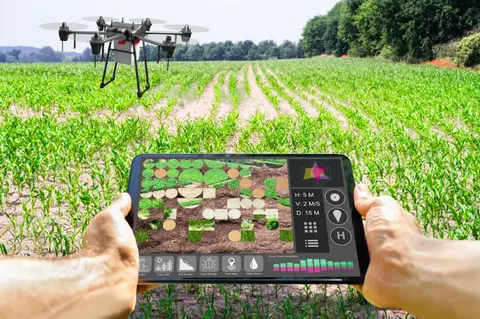Introduction
In an era where technological advancements are reshaping industries, agriculture stands at the forefront of a transformative revolution. The integration of Artificial Intelligence (AI) into crop management is unlocking unprecedented possibilities for precision farming, resource optimization, and sustainable agricultural practices. This article explores the future of agriculture, where AI takes center stage in crop management.
Precision Agriculture: A Paradigm Shift
Precision agriculture, empowered by AI, marks a paradigm shift in how farmers approach crop management. Instead of employing uniform practices across vast fields, AI enables targeted interventions by analyzing a myriad of data points. This includes soil health, weather patterns, crop health indicators, and historical yield data.
AI in Soil Health Assessment
Understanding soil health is foundational to successful crop management. AI algorithms process data from soil sensors, satellite imagery, and historical soil records to provide real-time insights. Farmers can receive detailed analyses of soil composition, nutrient levels, and moisture content, allowing for precise adjustments in fertilization and irrigation.
Crop Monitoring and Disease Prediction
AI-powered drones and sensors play a pivotal role in crop monitoring. These devices capture high-resolution images and data about crop conditions. AI algorithms analyze this information to detect early signs of diseases, pest infestations, or nutrient deficiencies. Timely identification allows farmers to implement targeted measures, reducing the need for broad-spectrum interventions.
Smart Irrigation Systems
Water scarcity is a significant challenge in agriculture. AI-driven smart irrigation systems optimize water usage by analyzing data on soil moisture, weather forecasts, and crop water requirements. This not only conserves water but also enhances crop yield by ensuring that plants receive the right amount of moisture at the right time.
Predictive Analytics for Yield Optimization
AI excels in predictive analytics, forecasting crop yields based on historical data, weather patterns, and various environmental factors. Farmers can make informed decisions regarding planting schedules, crop varieties, and harvesting times. This predictive capability mitigates risks and improves overall efficiency in agricultural operations.
Autonomous Farming Machinery
AI extends its influence to autonomous farming machinery, such as tractors and harvesters. These machines are equipped with sensors and AI algorithms that enable them to navigate fields, plant seeds, apply fertilizers, and harvest crops with precision. This not only increases operational efficiency but also reduces the labor-intensive nature of traditional farming practices.
Challenges and Ethical Considerations
While the future of AI in agriculture is promising, it comes with challenges and ethical considerations. Data privacy, ownership of agricultural data, and the potential for overreliance on technology are critical issues that need careful consideration. Striking a balance between technological integration and ethical use is imperative for sustainable and responsible agricultural practices.
Empowering Farmers through AI Education
Ensuring the successful adoption of AI in agriculture requires education and training for farmers. Familiarity with AI technologies, data interpretation, and the practical application of AI-driven insights are essential components of empowering farmers to harness the full potential of these innovations.
Environmental Sustainability and AI Practices
As agriculture embraces AI, maintaining a focus on environmental sustainability is paramount. AI-powered practices should contribute to reducing environmental impact, promoting biodiversity, and enhancing overall ecological balance. Ethical AI practices align with sustainable agriculture, fostering a harmonious relationship between technology and nature.
Conclusion
The future of agriculture, shaped by AI-powered crop management, holds great promise for increased productivity, resource efficiency, and sustainable practices. From precision agriculture to smart irrigation and autonomous machinery, AI is revolutionizing how we cultivate the land. However, a thoughtful approach to ethical considerations, education, and environmental sustainability is crucial to ensure a future where technology and agriculture coexist for the benefit of farmers and the planet.
